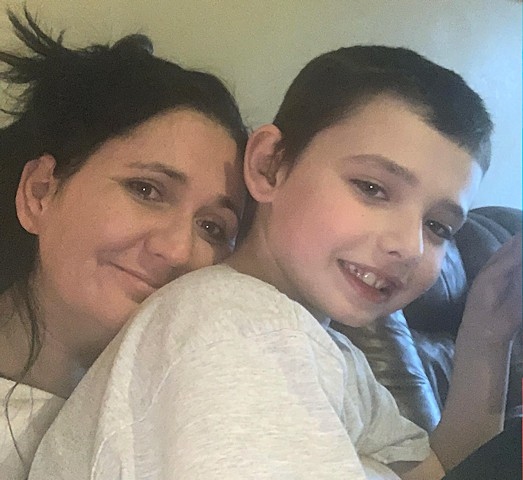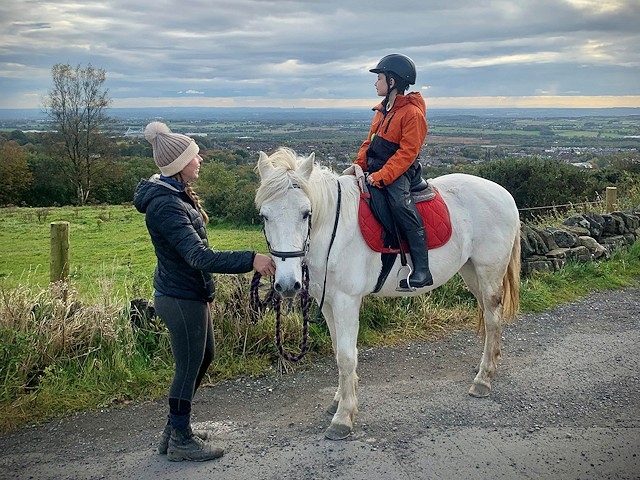‘Please don’t judge us’ – mum speaks out on challenges of looking after a child with special needs during lockdown
Date published: 08 January 2021

Tina Bailey, from Middleton with nine-year-old son Sam
The single mum of a boy with profound learning disabilities has urged people not to judge parents of special needs children as a third national lockdown gets underway.
Tina Bailey’s nine-year-old son Sam, who has autism, needs round-the clock-supervision to make sure he is safe.
After announcing a new lockdown on Monday night, the government said that children who, like Sam, have an Education, Health and Care Plan (EHCP) would still have a school place – together with others classed as vulnerable and the children of key-workers.
But Tina says some special schools are unable to offer five days a week, due to the extra challenge of keeping special needs youngsters safely socially distanced – particularly when staff are off.
She says Sam’s special school – Newlands Primary, in Middleton – has gone ‘above and beyond’ for them during the pandemic, and cannot praise it highly enough.
But at present it is only able to offer Sam a place on Thursdays and Fridays.
“Because special needs schools already have a high level of staff it only needs a couple of staff to be off and the whole school can’t open,” says Tina.
It means that, at times, parents have no choice but to take their child with special educational needs and disabilities (SEND) out with them on trips to the supermarket and other essential errands.
And, as people assume they should be in school, this has led to criticism and unkind comments from some members of the public.
Tina says things are not as straight-forward as they appear.
“It’s not necessarily about me, it’s across the board,” she says. “Going through Facebook yesterday there were other friends with SEND kids posting stuff like their kid had a meltdown in the supermarket.
“Someone had commented on their post saying ‘why are they not in school?’.
But, as Tina points out, if the schools are shut and the cupboards are bare, parents have no choice but to take children out with them.
“So many SEND parents at the moment are feeling so cut-off, isolated and vulnerable, because they feel everyone is going to be judging them,” says the 37-year-old freelance writer.
“If they are forced to go to the supermarket and push their child around, are other people going to be thinking ‘they are well enough to go to the supermarket but are too high risk to go to school’.
“That’s what people are saying on social media, Facebook, Twitter. That’s what parents who are already struggling are being faced with.”

Tina tries to avoid supermarkets, but if she has to go food shopping visits Asda’s Pilsworth store due to it having special trolleys that allow her to strap Sam in as you would a toddler.
“He has no awareness of personal space. If I took him to the supermarket he would be running laps, screaming with excitement, trying to grab things off the shelves,” adds Tina.
“I understand for other people that’s going to be frightening as well. As much as possible I order online or have friends and family drop stuff off.”
Tina remains frustrated that the government’s briefings do not make it clear that staff sick absences and staffing levels mean some schools – particularly those for SEND children – cannot open safely for all their pupils all the time.
And that means attitudes from the public are sometimes not as sympathetic as they might be.
For Tina, it is when she is walking her dogs with her son that she feels the most judged.
Sam does not like the cold and will show his frustrations in public by screaming and grabbing at her.
“He is frustrated with the cold but I have no choice but to do that,” she says. “If the dogs are walked he has a great relationship with them, but if they aren’t walked and are pacing around he gets frustrated, so I have to take them out.
“It’s like a vicious circle. If I’m out walking the dogs and people see Sam having a hard time they will think ‘why isn’t he in school’.
“I would love nothing more than him being at school. I would be able to work and contribute more and pay to put the dogs in doggy day care, but that’s not an option at the moment.”
Tina and Sam moved to Langley in December 2019, and Tina was getting more work than ever before the first lockdown was called.
She says trying to keep Sam on an even keel during the cycle of lockdowns that followed has been a massive struggle.
“Honestly, it’s been horrific,” she says.
“He needs routine. Most kids on the spectrum need a solid routine. He has gone from having everything in place to having nothing. Back in March it was awful. It took us six months to get some semblance of a new routine, then he had to go back to school and get in a new routine.
“We’ve just had the Christmas break, they are back in school one day and suddenly they are coming out again. He is meeting himself coming backwards.
“It’s as if they [the government] have not got a clue what it’s like for SEND parents.”

Sam’s disabilities are so profound that he does not understand that there is a pandemic or why his routine keeps changing.
“He is very much dependent on me for his personal care needs, it’s like having a 5’2” toddler in the house,” says Tina.
“You can’t take your eyes off him for a second.
“Everything you say to put out of reach of a toddler is not out of reach if they are 5’2” – or he can drag a chair to it and get to it that way.
“From the moment he is awake I’m in the line of site – it’s just too dangerous, otherwise.”
A single-mum, who works full-time, Tina describes herself as ‘an extreme’ case.
Caring for Sam has severely limited her ability to earn a living over the past nine months.
And she believes they would have been made homeless had they not moved into her late parents’ home in December 2019.
“If I was still living in my old house with a mortgage on it, we would not have made it this far,” she says.
“We would have been homeless months ago, that’s the long and short of it.”
Professionally she had her most successful ever months in late 2019 and early 2020 - but by May last year her income had dropped to ‘about zero’.
Her career went on hold over the next few months as she devoted her time to looking after Sam. During this period, Tina also lost her sister and had to reapply for respite care having moved boroughs.
“By the time September rolled around I was so stressed, exhausted and dead on my feet I needed some time for myself before settling down and getting back to work,” says Tina.
She worked from October to December – and is honouring work she had already accepted as she doesn’t want to let anyone down – but is unable to take on more.
Even when Sam is in school, Tina will spend Thursdays cleaning up the house, and using Friday as an opportunity to go food shopping.
“It’s a case of, whatever jobs I have already accepted I am having to do in the middle of the night, because I don’t want to let those buyers down. But at the moment I can’t take any extra work on,” she says.
Tina’s hope is that, despite government policy, people will realise that it is not always the case that special needs children can be in school – and adjust their attitudes according.
She adds: “I want to get the message out, so that if people see families with a disabled child in the supermarket etc, they won’t assume their parents have pulled them from school and now they are out shopping – that isn’t the case for us, or lots of other families.”
A spokesperson for the Department for Education said: “We have prioritised vulnerable children and children with Special Educational Needs and Disabilities throughout the pandemic. We know these are difficult times, and that’s why we’re addressing these issues urgently.
“Alternative provision and special schools remain open to vulnerable children and children of key workers, as with all schools. We are working closely with the sector and will publish guidance in due course.”
Newlands Primary School did not respond to a request for comment. However, the Local Democracy Reporting Service understands its current arrangements are in place to ensure staffing ratios area adequate to ensure its pupils are safely socially distanced.
Nick Statham, Local Democracy Reporter
Do you have a story for us?
Let us know by emailing news@rochdaleonline.co.uk
All contact will be treated in confidence.
Most Viewed News Stories
To contact the Rochdale Online news desk, email news@rochdaleonline.co.uk or visit our news submission page.
To get the latest news on your desktop or mobile, follow Rochdale Online on Twitter and Facebook.


